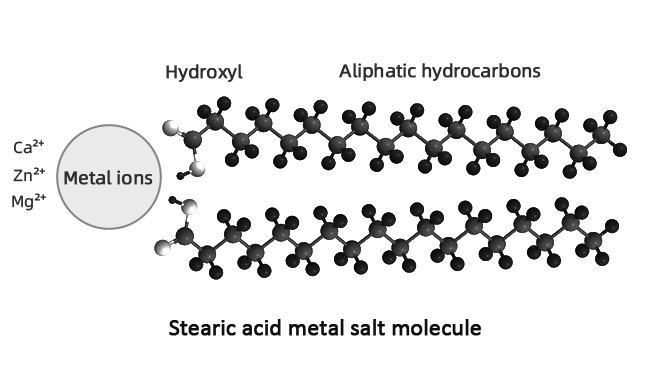Stearate: de breite Verwending vun multifunktiounsfaschte Chemialen an der Allag a der Industrie
Stearaten sinn eng Grupp vu wichtege Chemikalien, déi wäit an der Industrie, alldeeglech Chemikalien a Medizin benotzt ginn. Si besteet aus Stearinsäure kombinéiert mat Metallkationen a si hunn gutt Stabilitéit, Schmierbarkeet an antioxidant Eegeschafte. Allgemeng Stearaten enthalen Natriumstearat, Kalziumstearat, Zinkstearat a Magnesiumstearat. Dësen Artikel wäert d'Charakteristike an d'Haaptapplikatiounsberäicher vun dëse Stearaten am Detail entdecken, an hir spezifesch Uwendungseffekter an verschiddene Szenarien analyséieren.

1. Natrium Stea Taux (CAS 822-16-2 )A ke y Zutat vu Wäschmëttel bis perséinlech Hëtztprodukter
Sodiumstearaat ass een vun den méischt gebrauchten Stearaaten an spielt en wéierolle bei Detergents a Persoonlichkeitspflegemittelen. D'Registriervumme vum Sodiumstearaat gëtt der gutt Emulgierung, Schaumgebann a Réinigungsëigenschaften, wobai et ofta beim Formulieren vun Seifen, Shampoos a Visage-Réinigers used gëtt. Zouschtedder sinn de bascheschen Eigenschaften vum Sodiumstearaat och eng effektiv Ingrédient fir Metalbearbeetungslubrikanten, wat der Qualité vun der bearbeedter Metalloberflächen bessert.

Anwendungsfall: Sodiumstearaat ass een vun den wichtigsten Ingredienzen bei der Seifenschmiedung, wat der Seife erlaabt, schnell ze schaumen a eng réichen Schaumbann ze leveren. Zouschtedder performt Sodiumstearaat och gut beim Metalloberflächentreatment a kann als Ingredienzt fir Poliuren as Gëschäft gemaach ginn, um eng glat, resitiduofree Oberflach ze leveren.
2. Calcium Stearate (CAS 1592-23-0)  : Dubellrolle vum Stabilisator a Lubrikant
: Dubellrolle vum Stabilisator a Lubrikant
Calciumstearat ass eng Stärat mat geringer Löslechkeet an guter Wäerresistenz. Es gëtt of als Stabilisator fir Plastiken wéi PVC a als Schmierstoff fir Gummiprodukte benotzt. Well Calciumstearat net bei hoche Temperatur zerfällo, kann et effektiv den Dienstleben vun Produkteren an der Plastikbearbechtung ërlängeren an gelbende reduzéieren. Zousätzlech ass Calciumstearat eng toksesch Stoff a gëtt iwwerall an der Fuet un der Medezintechnologie benotzt. Zum Beispill kaen et als Antiverklotzungsagent fir Fuet benotzt ginn, sou datt Pulveragglomerationen verhërre ginn a d'Produktuniformitéit gesichert gëtt.

Anwendungsfall: Calciumstearat gëtt als Antistatikum bei der Fabrikatioun vun Dräden an Kabelen benotzt, sou datt Stécksammlung verhërt gëtt, wat der Ästhetik a dem Dienstleben vum Produkt hëlft ze besseren. Gläichzeitig kaen Calciumstearat der Plasticprodukte der Steifheetschtaffel besseren a de Fertigprodukte méi biesträgdeg machen.
3. Zinkstearat (CAS 557-05-1)  : Een ideale Zutat fir umweltfreundlech Verfärven an Kosmetika
: Een ideale Zutat fir umweltfreundlech Verfärven an Kosmetika
Zinkstearaat ass eng Chemikalie mat starker Hydrophobizität an auszeichnungswerter Glätte, a wird breitgféierlt bei umweltfreundleche Verfärven, Kosmetika a Reifenprodukte geschotzt. Zinkstearaat fungeert als Freigabeelement an Plastiken an Reifen, wat déi Innerrand vum Mouss glatter maacht a verhëlt dat Produkt vum Kleeft. Duerch dës ass Zinkstearaat och breitgféierlt an Kosmetika geschotzt fir Kosmetika e feenfein an glatt Textur ze géieren a seng Flexibiliteet ze besseren.

Anwendungsfall: Beim Kréien vun Kosmetika kann Zinkstearaat an Pulverprodukte schéng wie Foundation an Oogenschatten gebraucht ginn fir Kosmetika eng glatte Textur ze géieren. Et kann och effektiv Öl op der Haut absorbéieren an de Haltbarkeet vun Make-up verlängeren. Beim Prozesséieren vun Plastiken huelen de hydrophoben Eigenschaften vum Zinkstearaat den Stabiliteit vun Produkten an feuchten Umgebungen an verhëlt Feuchtigkeitsoption a Deformatioun.
4. Magnesiumstearat (CAS 557-04-0): Antiverklibungsadditiv in Medizinprodukte a ernährungsliechen Supplementen
Als sicher Antiverklibungsadditiv gëtt Magnesiumstearat ofentlecht bei der Produktion vun Medezinerprodukteren a Gesondheitseroprodukte benotzt, um pulverförmeg Zuesatzen der Verklibung ze verhëieren, woburd der Konsistenz a Flüssigkeit vum Produkt gesichert ginn. Zusätzlich gëtt Magnesiumstearat och an Kosmetikprodukteren benotzt, um dengem Produkteren een leichten Textur ze geben an net fettig ze sinn. Wéinst Magnesiumstearat hydrophobesch ass, gëtt et och bei der Bearbeet vun Plastiken benotzt, um den Akkumulatioun vun statischer Elektrizitéit ze reduzéieren.

Anwendungsfall: Bei der Produktion vun Tabletten gëtt Magnesiumstearat als Antiverklibungsadditiv a Schmierstoff benotzt, um eng gut Pulverfluss wärend dem Pressprozess ze gewährleegen, wodurch en glatt Tablettenoberfläche resultéiert. An der Kosmetik gëtt d’Hydrophobizität vum Magnesiumstearat ee wichteg Zuesatz beim Producteren vun Pulver a Rouge, woburd de Make-up drogen hält.
Erweiterter Zusammenhang: Synergische Effekt vun Stearaten mat anere industrielle Chemikalien
Um den Anwendungseffekt von Stearaten zu verbessern, werden sie in vielen Industrie-Prozessen in Kombination mit anderen Chemikalien eingesetzt. Zum Beispiel in der Kunststoffverarbeitung werden Stearate oft zusammen mit Initiatoren wie Azobis-isobutyronitril (AIBN) verwendet, das Polymerisationsreaktionen bei niedrigeren Temperaturen initiieren kann und so die Wirkung von Stearaten als Stabilisatoren und Schmierstoffe verbessert. Darüber hinaus wird Acrylsäure oft mit Stearat kombiniert, um die Haftung und Transparenz des Beschichtungsmaterials zu verbessern, was dazu führt, dass Stearate im Beschichtungssektor noch weiter verbreitet werden.
Umweltschutz und zukünftige Trends: Nachhaltige Entwicklungsprospekte für Stearate
Wéi de Forderungen an den Umweltschutz immer strikter wierden, maachen d'natürlech Quell un de Netoxizität vum Stearate aus es zur krittigen Wahl fir méi gréng Industriezeechen. Déi Zukuftswerwert vum Stearate an biologesch abbaare Materialen an umweltfreundlech Lacken gëtt weider erforscht. Zum Beispill, déi Abbaabär gouf vum Sodiumstearate an Zincstearate helpt bei der Entwécklung vun umweltfreundleche Plastikproduitscheren. Gläichzäitig, an der Pharmazeutik- an Foudindustri, Stearate, als sicher Additiv, ass erwaart, dat een wichtiger Rolle spielt bei der Verbesserung vun Produktsicherheetsch a deng Schéllewen.
Stellen hohe Qualité vum Stearate-Produitschenger zur Verfügung fir déi Innovatioun vun Epletatious
Wann Dir hohe Qualité vum Stearate-Produitschenger bréisst, mir be de Foconsci Chemical Industry Co., Ltd. bieden eene Vielgaart vun Stäarat-Lösungen an, inklusive Sodium Stäarat (CAS 822-16-2), Calcium Stäarat (CAS 1592-23-0), Zinc Stäarat (CAS 557-05-1) a Magnesium Stäarat (CAS 557-04-0). Äre Produits sinn geeignet fir engerlei Industriezweeche wie Plastiken, Kosmetik a Medezin. Si entspréißen internationalen Qualitéitsstadarden a kënnen dir helpen, Anwendungen ze innovéieren a Produkter op ze optiméieren.
Haut e puerkontakt mat eis fir méi Produktenformatiounen oder profeschoanel Anwendungratgäven!


 EN
EN
 AR
AR
 BG
BG
 HR
HR
 CS
CS
 DA
DA
 NL
NL
 FI
FI
 FR
FR
 DE
DE
 EL
EL
 HI
HI
 IT
IT
 JA
JA
 KO
KO
 NO
NO
 PL
PL
 PT
PT
 RO
RO
 RU
RU
 ES
ES
 SV
SV
 TL
TL
 IW
IW
 ID
ID
 LV
LV
 LT
LT
 SR
SR
 SK
SK
 VI
VI
 HU
HU
 TH
TH
 TR
TR
 GA
GA
 CY
CY
 KA
KA
 LA
LA
 MN
MN
 KK
KK
 LB
LB


